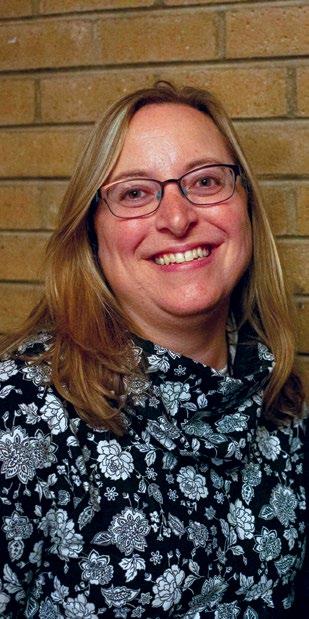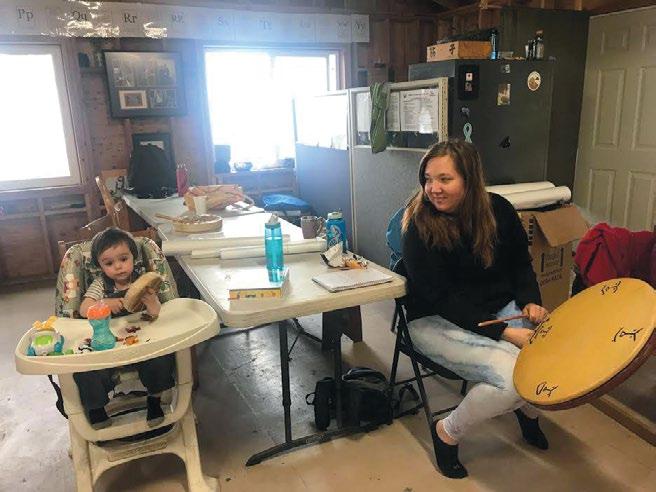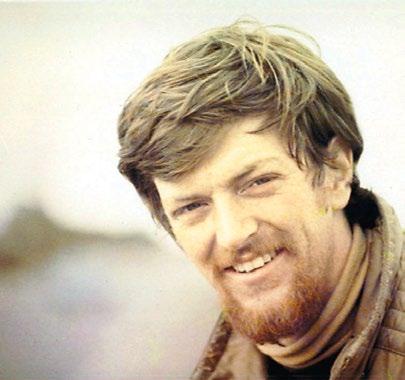
11 minute read
Connecting Across Cultures
CLARA

Advertisement
MELISSA
LEFT: Clara Barton with Susan Malutin at Dig Afognak culture camp. RIGHT: Melissa Silugngataanit’sqaq Borton.



IN THE SUMMER OF 2018, Melissa Silugngataanit’sqaq
Borton and Clara Barton met at a summer camp at Dig Afognak, where tribal members, youth, and visitors can be immersed in the Alutiiq culture. The women struck CLARA: Two summers ago, I was deeply honored to have the up a friendship. Melissa, who now opportunity to go to an Alutiiq language and immersion camp at Dig works as Indigenous AdvanceAfognak. I remember, as the weeks led up to camp, I was nervous ment Director at First Alaskans as could be. As a Deaf person going to “their” language and music
Institute, was, at the time, the immersion camp, I wasn’t sure how I would fit in and I also wanted to
Tribal Administrator for the be able to show respect to their culture and to their people.
Native Village of Afognak and camp director. Clara, who works for the Alaska State School for the Deaf and Hard of Hearing at MELISSA: In the summer of 2018, I received a call from the Russian Jack Elementary School, Alaska Humanities Forum regarding a unique opportunity to attended camp as a participant host a Deaf teacher from Anchorage at camp. Remote camps in the Forum-sponsored Educathat are situated far from towns and cities have limited modern tor Cross-Cultural Immersion conveniences; evaluating risk when bringing in new people is program. They recently reflected always a concern. However, Dig Afognak is known for being an on the unexpected connections inclusive camp, celebrating our people, educating our youth, and they discovered through the striving towards an equitable future for Alaska Native youth. experience. We welcomed Clara with open arms and worked through the challenges to ensure she would be safe and benefit from the experience.
“Something so simple, to make To be honest, there was a bit of apprehension from all of the staff sure we were communicating in having Clara join us, mostly because the camp is on an active in a respectful way with her, bear trail and our method of identifying danger is through sound. Our primary goal is keeping campers safe—if they can’t hear the made all of the difference.” horn when there’s a bear in the area that could put them in danger. -- Melissa Thankfully, Clara was accompanied by an interpreter and we made sure they were together when necessary.
CLARA: Melissa greeted me when I arrived and brought me over to the log cabin that I was to be staying at. There were four people already there just kind of hanging out and talking. Everybody turned to look at me and Melissa said, “Hey, this is Clara, and she’ll be staying here. Would you mind introducing yourselves?” So everybody introduced themselves and then went on with their conversation, completely ignoring me. I wanted to be like, “Hey, you guys, I’m Deaf, I’m part of a marginalized group, I know how this goes. I know I look white, but I’m Japanese. I’ve experienced oppression...” But I stopped myself and thought “this trip opportunities to interact with Deaf people, so we had very little knowledge of how best to communicate with them. This became apparent to me at the start of camp when I began noticing that campers didn’t know
is not about me. It’s about them.” So I held all of those



MELISSA: Growing up in Kodiak, we rarely had thoughts back and on we went.
how to act around Clara or how to communicate. I approached her during a meal early on and asked her several questions about being Deaf, such as, “Do I look at you when I speak to you, or your interpreter?” Something so simple, to make sure we were communicating in a respectful way with her, made all of the difference. We sat there visiting and asking questions back and forth and I began to realize that the oppression she feels every day as a Deaf person is the very same oppression, racism, and inequity we feel as Native people.
CLARA: The Elders that were part of the camp were a little standoffish at first. But one evening, one of them came up to me and said, “Hey would you mind, if you’re comfortable, when we’re in our sharing circle in the yurt, could you tell us a little bit about your experience as a Deaf person?” So when the night came, we were in the sharing circle talking and somebody asked the question: “Hey, so you’re Deaf but I just heard you laugh. Deaf people laugh? How does that work?” I answered all the questions they wanted to ask; it was interesting to hear what they wanted to know.


MELISSA: I was a bit nervous at first when Clara agreed to answer questions and anticipated nobody would ask anything. Just in case, I came prepared with a list of questions. After one of my questions, the kids’ hands started popping up like popcorn. The time flew by and the discussion was rich and meaningful. After that moment, everyone in camp was attempting to sign to Clara, they were speaking to her instead of her interpreter, and welcomed her into camp like she was no different from them. “I began to realize that the oppression she feels every day as a Deaf person is the very same oppression, racism, and inequity we feel as Native people.” -- Melissa

CLARA: The camping program itself actually has several parts and you can rotate to different sessions throughout the day. I went into the language class and people were speaking Alutiiq and then I had my interpreter and it was really hard to kind of muddle through that. But when I got to the music class, I was just drawn to it.
In the music workshop they were dancing, telling stories in their Native language, and there was a group on the side that was drumming. It just gave me chills to be a part of that experience. I didn’t want to make a mistake, so I just hesitantly started to drum and then I started to take in the dancers and I could see the story and I felt more confident in my drumming. I really got into it. I started to think, “Why am I feeling so connected?” As part of Deaf culture, rhythm is really important. We have a lot of drumming in our cultural celebrations, in our gatherings. I started to see so many parallels between my culture and the Alutiiq.

MELISSA: We chose to have Clara attend the language and music camp because we strive to teach our youth the importance of learning and being proud of their language. Since Clara also uses a language other than English, we felt this could be a valuable bridge and an amazing learning opportunity. In addition, with music throughout camp, Clara could “feel” how important our culture is to us.


CLARA: Another connection I saw was that in the Alutiiq culture, you introduce yourself by sharing your name, your parents’ names, and your grandparents’ names. And then what tends to happen is people will say, “Oh, I know your grandma, your grandpa—we used to sit down and chat all the time.” And it’s the exact same thing in the Deaf culture. We are a very small world in the Deaf community, and so if you meet somebody you say, “What’s your last name?” and that often leads to, “Oh, I know your dad, you know. We were in the same class, we graduated together.”
Another parallel that really stuck out to me is that in the Alutiiq culture, their language is a dying language. English has oppressed it, and everybody has been encouraged to speak English—that’s one of the reasons that the camp was actually established. And that is very much happening to American Sign Language (ASL) as well. We get the message that it’s important to speak, read, and write English and that it’s more valued than ASL. There’s a tradition, too, in the Deaf culture with name signs. We have a name sign that is a specific identifier for who we are, and it’s usually associated with our personality, given by a Deaf family member or the Deaf community. It’s an honor and almost a rite of passage to be given your sign. Alaska Native people also have a Native name and an English name. In both cultures, outsiders ask if they can be given a name. I tell people, “No, these are very cherished things and you can’t just get one for free unless you’re part of the community.”

DIG AFOGNAK BEGAN IN 1993 as part of a community-wide effort to regain, restore, and carry forward the Alutiiq culture following the Exxon-Valdez oil spill in Prince William Sound. As clean-up efforts to restore the damaged coastline disturbed archaeological sites throughout the Kodiak Archipelago, the Native Village of Afognak enlisted archaeologists to work alongside Native landowners to recover and preserve culturally significant materials and artifacts. Dig Afognak was transformed into a haven for cultural exploration, and summer camps were developed to immerse tribal members, youth, and also visitors from outside in the Alutiiq culture through hands-on activities in the ultimate outdoor classroom, completely unplugged from modern day distractions (afognak.org/dig-afognak).
The Alaska Humanities Forum partners with Dig Afognak and other culture camps across the state to provide an immersion experience that is a critical element of its Educator Cross-Cultural Immersion (ECCI) program. Each summer, about 30 teachers from the Anchorage, Fairbanks, MatanuskaSusitna Borough, Kenai Peninsula Borough, and Juneau school districts travel to camps to build skills and understanding that will help them to better serve their Alaska Native students, communicate across cultural differences, and incorporate Alaska Native Ways of Knowing and Learning into their classrooms. In addition to the immersion experience, educators earn graduate-level credit for coursework in cross-culturally competent pedagogy. The program has been funded by the U.S. Department of Education’s Alaska Native Education Program since 2001.

MELISSA: My one takeaway from this experience was how amazed I was that Deaf people get many of the same reactions from people that Native people get. Such as, being treated like an outsider, expected to assimilate into a society instead of honoring the uniqueness of our own people. As someone who works professionally to right inequities towards people of color, I’m a bit embarrassed that this was a lesson I had to learn at all. I value the experience I had with Clara so very much. In fact, she and I have a dream of being able to host deaf Native students at culture camp one day.


CLARA: I remember feeling really sad about the ending of camp. The whole time that I was there, there was one elder, just one, who kind of kept his distance from me. I was a little intimidated by him, but he came right up to me at the end—he was very direct in his style—and he said, “Did you have fun at camp?” I looked at my interpreter and I was like, “Mmmhmm. Yep, yep.” He said, “Oh, that’s good. I’m Bobby.” And I said, “Oh, OK, well my English name is Clara, and my name in my language is [the sign],” and he gave me this big hug. I just had this incredible sense of connectedness with my Deaf identity and confidence about who I am, more than ever before. And imagine, I got that from a language and music immersion camp full of hearing people who don’t sign. ■
Invest in Alaska. Our communities. Our future.
Your donation deepens understanding, trust, and connection across Alaska.
It's an investment in programs, grants, events, and publications that connect people through stories, ideas, and experiences.
Please support Alaska Humanities Forum by making a gift to sustain these opportunities and resources into the future.
Your donation makes a real, lasting difference in communities across our state. Thank you.
akhf.org











